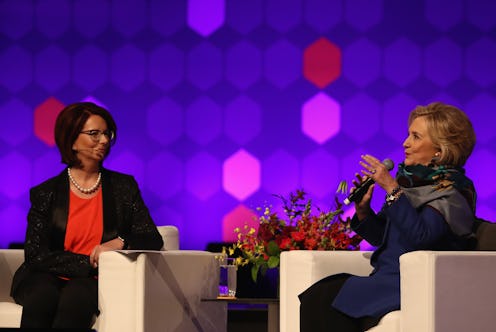News
This Video Of Hillary Clinton Talking About Being A Woman In Politics Is A Must-See

Hillary Clinton knows a thing or two about what it's like to be villainized for being a strong and assertive woman in a male-dominated industry. Over the course of the 2016 presidential election, the Democratic nominee was called a lot of things — Shillary, nasty woman, a demon, the Wicked Witch of the Left, and yes, even the devil. But Clinton isn't the only powerful woman to ever be cast as a witch or to have her voice and physical appearance torn apart. Julia Gillard, Australia's first female prime minister, battled a similar rhetoric when she came into office in 2010. While swapping stories at a women's leadership summit in Australia, Clinton and Gillard discussed the obstacles women in politics face, including pesky rumors of witchcraft.
"Research shows the more successful a man becomes, the more people like him," Clinton told Gillard at the Women World Changers event in Melbourne on Thursday. "But for women it's the exact opposite. Women are seen favorably when we advocate for others, but unfavorably when we advocate for ourselves."
According to Clinton, efforts to attack and criticize women's voices, physical appearance, or choice of clothing or hairstyle are "a serious way of undermining women's confidence and putting women on the defensive" in an effort to get the upper-hand. "Look, the double standard is alive and well and it is more difficult for women in public positions," Clinton said when asked how she'd felt about the intense scrutiny of her scrunchy collection.
But Clinton also noted that expectations about how women should look appeared to be deeply rooted in our collective DNA, making it so that people feel free to comment on women's physical appearance or clothes or hair. "Some of that is because we are still getting used to seeing women in these roles," Clinton went on to say. Men's various shapes, sizes, and hairstyles aren't remarked upon, according to Clinton, because people are used to seeing men in public roles.
"When you are the only woman doing something or you are the first woman doing something there is no basis of comparison and so the attention is really focused on the superficial in part because people are trying to make sense of it," she said. "We're still breaking through." But Clinton also acknowledged that part of the reason women continue to be dismissed or criticized for their looks is that a portion of the population remains "uneasy" about seeing women in leadership positions. "The easiest way to avoid having to look at someone on her merits is to dismiss her on her looks," she said.
Such conversations about women's looks are, however, just the tip of the iceberg, Gillard noted, adding that the rhetoric surrounding women in politics can easily "cascade into a really nasty end." Gillard, who served as Australia's first female prime minister from 2010 to 2013, said she was referred to as a "witch" and that a commentator once said she should be "put in a chaff bag and drowned at sea."
"I had to point out that you couldn't drown a witch," Gillard said with a chuckle.
Gillard also said it had "dismayed" her to see people chant "lock her up" or "string her up" in reference to Clinton at Republican rallies. "It's like the Salem witch trials," Gillard said.
For Clinton, such rhetoric was proof that, despite the strides women have made, some people still chafe at the idea of a woman in power. "There is this fear, there is this anger, even rage at women seeking power, women exercising power and people fall back on these attacks like you are a witch or you should go to prison," she said, noting that women have faced misogynistic and sexist vitriol throughout history. Clinton argued that the folks behind these remarks "know the power of misogyny" and "know that, at the very least, you can [use them to] plant doubts about a woman in people's heads."
"It's a strategy," Clinton said.
Disclosure: Hillary Clinton's son-in-law Marc Mezvinsky joined Social Capital, an investor in Bustle Digital Group, in mid 2017 and joined the Board of Bustle Digital Group in early 2018.